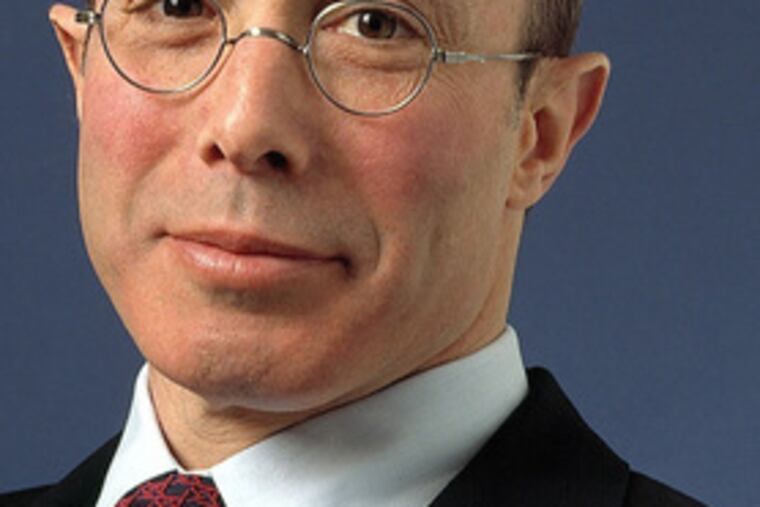PhillyDeals: Insurance leader says 'no' to bailout
Should the government bail out the insurance industry, too? "We are adamantly opposed to taxpayer capital being used for the insurance industry. That goes for both general and life insurance. There is simply no need or cause," said Evan Greenberg, chief executive of Ace Ltd., whose North American business is based in an elegant restored building at 436 Walnut St., amid Philadelphia's old Insurance Row.

Should the government bail out the insurance industry, too?
"We are adamantly opposed to taxpayer capital being used for the insurance industry. That goes for both general and life insurance. There is simply no need or cause," said Evan Greenberg, chief executive of Ace Ltd., whose North American business is based in an elegant restored building at 436 Walnut St., amid Philadelphia's old Insurance Row.
Asked about government plans to bail out insurers along with banks, Greenberg told investors in a conference call that the funds Congress raised for bailouts "should be used as Treasury intended them, to prevent systemic risk," or to "inject liquidity into the credit system." Not for solvent insurers.
Insurers have lost billions to hurricanes and depressed investments. But they can afford to cover their losses, he said. Plus, insurance rates are starting to rise - good news for his business, if not for policyholders.
Federal money "would represent a cheap and distorting subsidy from the government, rather than a means of crisis correction," Greenberg (at right) concluded. "In short,
taxpayers should be a last resort, rather than a cheap source of capital."
Not all insurers see it that way. Life insurers, particularly, have blown billions more in bad investments. Some have asked for federal help.
Yesterday, when analysts asked Radnor-based Lincoln Financial Group chief executive Dennis Glass if he'd be willing to convert his life, annuity and investment company to a bank holding company, and accept federal regulation in exchange for a government investment, Glass said, "Based on what I know, the answer is, we would do that."
Son rising
Evan Greenberg's emergence as a combative industry leader parallels Ace's emergence from the shadow of longtime property-and-casualty industry leader A
merican International Group
- where Greenberg was once president, and where his father,
Maurice "Hank" Greenberg
, was chief for most of its history. AIG was taken over by the federal government as it ran out of money last summer.
Ten years ago, Ace was an ambitious Bermuda-based company muscling its way into the global property-and-casualty business, one deal at a time.
Its key purchase, says Brian Dowd, Ace's Philadelphia-based chief executive for insurance in North America, was the 1999 purchase of Philadelphia's Insurance Co. of North America from Cigna Inc., which now forms the backbone of Ace's U.S. operations.
The company hired a string of aggressive executives; some have gone on to run other companies. It trimmed, then doubled, its Philadelphia-area workforce, which is now more than 2,000, Dowd said.
Ace hired Evan Greenberg in 2001, a year after he quit AIG. The son became CEO of Ace in 2004, a year before his father finally stepped down as AIG chairman and CEO.
Industry analysts worried Ace would try to cut prices on AIG, and end up like Philadelphia's former Reliance Group Holdings and other failed firms that specialized in risky business AIG wouldn't write.
But unlike AIG, Ace avoided big investments in home loan-backed securities, heavy loans against its portfolio, and credit-default insurance - the things that forced AIG to the wall.
According to Evan Greenberg, Ace may buy some AIG units - and is already winning AIG customers.
"There is opportunity from AIG," Greenberg told investors. He added that insurers "owned by the government" (AIG is the only such, for now) are losing business, while Ace has attracted as much new business in October as in the whole fourth quarter of last year.
Evan Greenberg also complained that "the one large player who is under stress" - again, AIG - has been "aggressively cutting pricing in an irresponsible way to maintain business, and it is worrisome." Ace won't do that, he promised. But "we will shoot the birds as they go by."
AIG spokesman Peter Tulupman says his company is "not sacrificing rate to retain market share." To the contrary, it's been boosting U.S. business insurance prices since mid-September, he said.
"It's possible the allegations of price-cutting are coming from markets frustrated by their inability to win significant market share from AIG," Tulupman added. "Our market strength and customer relationships were built over many years, and are not easily replicated."
We like to think these guys really are competing, amid the bailouts.